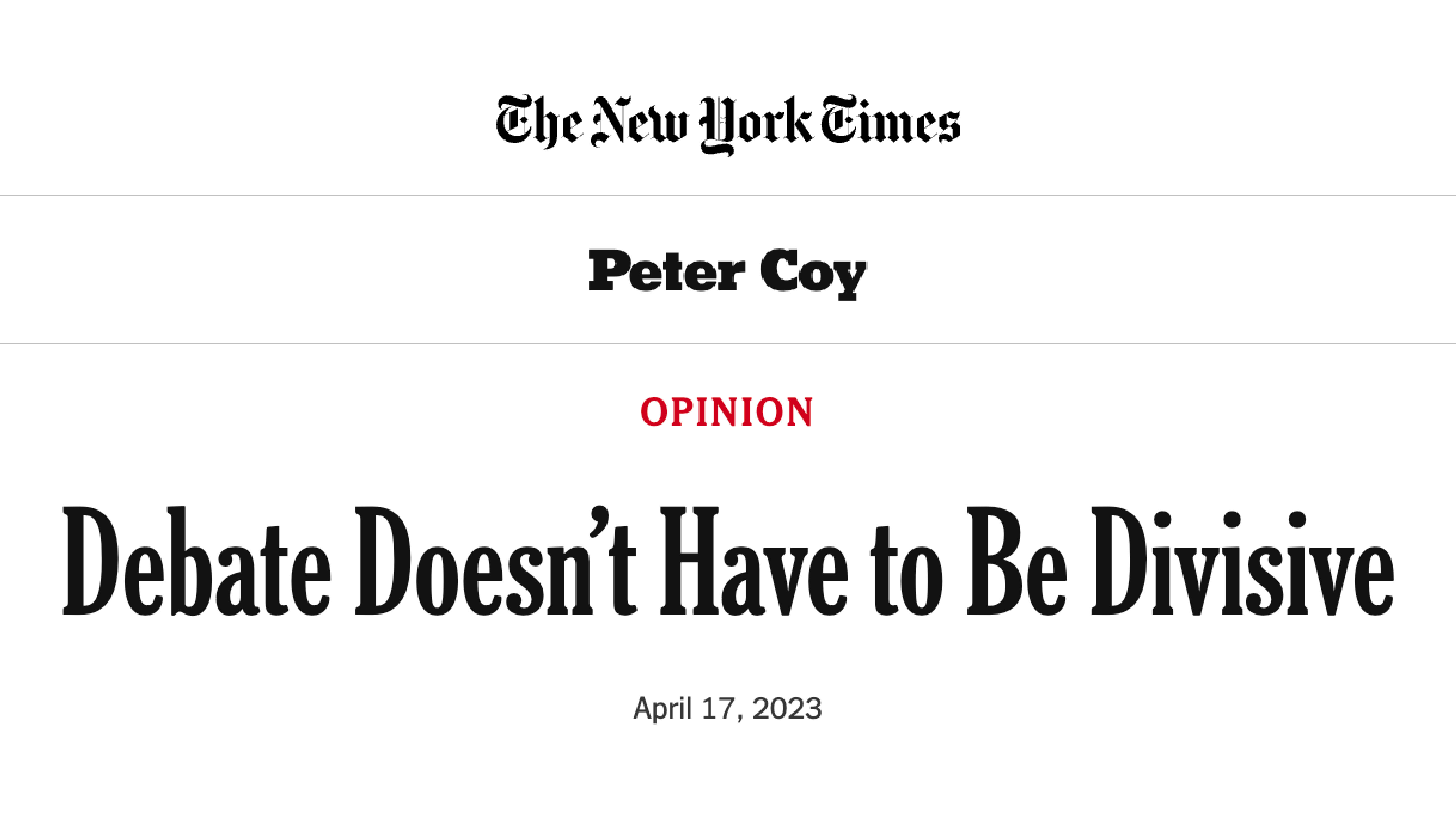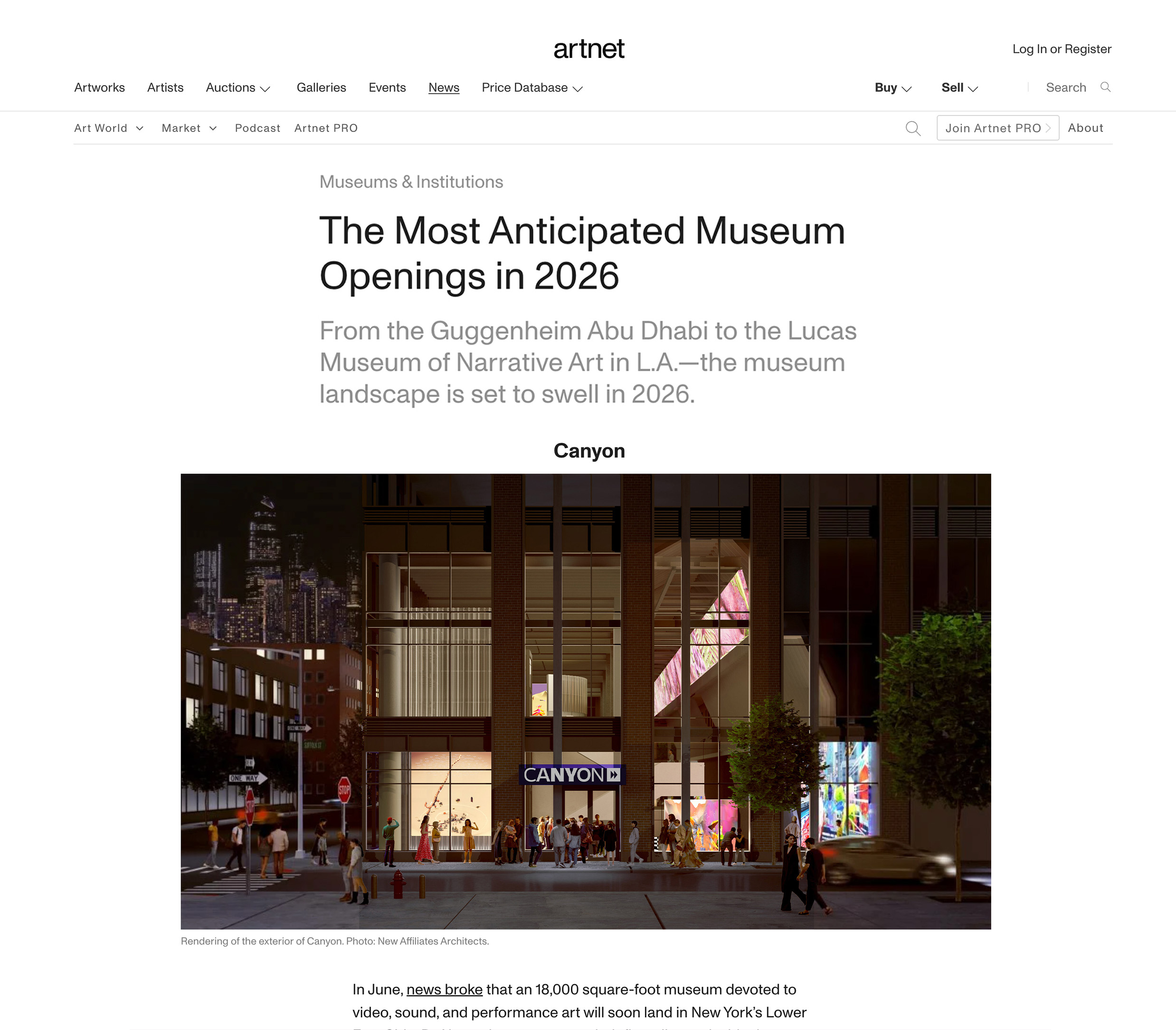Open To Debate Featured in the New York Times
The New York Times
4/25/2023
The New York Times writer Peter Coy mentions Open To Debate in his article "Debate Doesn't Need to Be Divisive, see the article here.
There are good debates and bad debates. The bad ones are like the argument sketch from the old British television show “Monty Python’s Flying Circus.” A man who has paid to have an argument complains that his interlocutor is simply contradicting him. “Argument is anintellectual process,” he insists. “Contradiction is just the automatic gainsaying of anything the other person says.” The interlocutorresponds, “No, it isn’t.”
Monty Python was a half-century ahead of its time. A lot of debate today is nothing but gainsaying, bludgeoning and maneuvering fortactical advantage without regard for the truth. The modern exemplar of debate-as-conflict is former President Donald Trump, who indefiance of what everyone saw continues to describe the attack on the Capitol in 2021 as a mostly peaceful act of love.
What makes debate a topic for economics is that free markets don’t fare well in free-for-alls. They require social cohesiveness. To dobusiness, people don’t have to agree with one another, but they do have to treat one another with respect and fairness. Bad debate deepensdivisions; good debate can heal them.
That brings me to Open to Debate, the new name of what was founded as Intelligence Squared U.S. Debates. Since 2006, the nonprofit NewYork-based organization has staged more than 200 debates on propositions and questions including “Declinists Be Damned: Bet onAmerica,” “Is the Democratic Party Too Far Left?” and “Artificial Intelligence: The Risks Could Outweigh the Rewards.”
Until Covid hit, Intelligence Squared used a live, gladiator-style format. Members of the audience would vote for the side they agreed withbefore the debate and again after it. The side that managed to shift opinion in its direction won, even if it still commanded only minoritysupport. One gratifying finding was that, on average, 32 percent of those in the audience changed their minds.
In April 2020, Intelligence Squared stopped having live events. In July 2022, it stopped declaring a winner of the debates. It has sinceresumed some live events, but it hasn’t brought back the declaration of a winner, and doesn’t intend to. It has been using a kinder andgentler format for a less kind and gentle era.
Last week, Intelligence Squared took another step away from the gladiator format by changing its name and website and announcing anew focus on outreach, vowing that “at scale” its approach “can change the direction we’re headed in America.” Its first debates as Open toDebate: “Is Florida Eating New York’s Lunch?” and “Are Men Finished and Should We Help Them?”
Can better debate really change the nation’s direction? In a small way, maybe. To find out more, I interviewed Clea Conner, the chiefexecutive of Open to Debate, as well as John Donvan, who is the moderator of the debates and a former chief White House correspondentfor ABC News.
Conner told me that the organization abandoned “the whole win/lose construct” because it was hindering its mission of promotingdialogue. She said Adam Grant, a professor at the University of Pennsylvania’s Wharton School and a contributing New York TimesOpinion writer, is working with Open to Debate on finding new data points to measure “how debate opens minds.”
A skeptic of the project would say that people don’t debate to get at the truth, but to vanquish their opponents, and that’s true whetheryou’re Donald Trump, Monty Python’s John Cleese or anyone else. “Reasoning does exactly what can be expected of an argumentativedevice: Look for arguments that support a given conclusion, and, ceteris paribus, favor conclusions for which arguments can be found,” theFrench cognitive scientists Hugo Mercier and Dan Sperber wrote in the journal Behavior and Brain Sciences in 2011.
The Open to Debate people are well aware of this dissent on debate; I know because Grant is the one who emailed me the link to themotivated reasoning paper.
But they remain hopeful. “We should be able to disagree without having to hate each other,” Donvan told me. In the old days, he said, hismain job as moderator was keeping time. “Increasingly, my role is to kind of protect the integrity of the arguments,” he said. “I want tomake sure people are at least hearing each other. Finding common ground is not the point, but common ground may be exposed.”
In moderating, Donvan said, he has begun borrowing ideas from other arenas in which people come into conflict, such as couplescounseling. “If we can get out there and show that on tough issues there is a way to have conversations that doesn’t have to be mired inacrimony, that’s good,” he said. “We’re all worried about polarization, demonization, separation. I really would love it if in our small way wecontribute to the idea that we can disagree but we have a ton of shared interests.”
“I don’t think that’s Pollyanna,” Donvan said. “I very much believe in the pivot that we’re making.”
There are good debates and bad debates. The bad ones are like the argument sketch from the old British television show “Monty Python’s Flying Circus.” A man who has paid to have an argument complains that his interlocutor is simply contradicting him. “Argument is anintellectual process,” he insists. “Contradiction is just the automatic gainsaying of anything the other person says.” The interlocutorresponds, “No, it isn’t.”
Monty Python was a half-century ahead of its time. A lot of debate today is nothing but gainsaying, bludgeoning and maneuvering fortactical advantage without regard for the truth. The modern exemplar of debate-as-conflict is former President Donald Trump, who indefiance of what everyone saw continues to describe the attack on the Capitol in 2021 as a mostly peaceful act of love.
What makes debate a topic for economics is that free markets don’t fare well in free-for-alls. They require social cohesiveness. To dobusiness, people don’t have to agree with one another, but they do have to treat one another with respect and fairness. Bad debate deepensdivisions; good debate can heal them.
That brings me to Open to Debate, the new name of what was founded as Intelligence Squared U.S. Debates. Since 2006, the nonprofit NewYork-based organization has staged more than 200 debates on propositions and questions including “Declinists Be Damned: Bet onAmerica,” “Is the Democratic Party Too Far Left?” and “Artificial Intelligence: The Risks Could Outweigh the Rewards.”
Until Covid hit, Intelligence Squared used a live, gladiator-style format. Members of the audience would vote for the side they agreed withbefore the debate and again after it. The side that managed to shift opinion in its direction won, even if it still commanded only minoritysupport. One gratifying finding was that, on average, 32 percent of those in the audience changed their minds.
In April 2020, Intelligence Squared stopped having live events. In July 2022, it stopped declaring a winner of the debates. It has sinceresumed some live events, but it hasn’t brought back the declaration of a winner, and doesn’t intend to. It has been using a kinder andgentler format for a less kind and gentle era.
Last week, Intelligence Squared took another step away from the gladiator format by changing its name and website and announcing anew focus on outreach, vowing that “at scale” its approach “can change the direction we’re headed in America.” Its first debates as Open toDebate: “Is Florida Eating New York’s Lunch?” and “Are Men Finished and Should We Help Them?”
Can better debate really change the nation’s direction? In a small way, maybe. To find out more, I interviewed Clea Conner, the chiefexecutive of Open to Debate, as well as John Donvan, who is the moderator of the debates and a former chief White House correspondentfor ABC News.
Conner told me that the organization abandoned “the whole win/lose construct” because it was hindering its mission of promotingdialogue. She said Adam Grant, a professor at the University of Pennsylvania’s Wharton School and a contributing New York TimesOpinion writer, is working with Open to Debate on finding new data points to measure “how debate opens minds.”
A skeptic of the project would say that people don’t debate to get at the truth, but to vanquish their opponents, and that’s true whetheryou’re Donald Trump, Monty Python’s John Cleese or anyone else. “Reasoning does exactly what can be expected of an argumentativedevice: Look for arguments that support a given conclusion, and, ceteris paribus, favor conclusions for which arguments can be found,” theFrench cognitive scientists Hugo Mercier and Dan Sperber wrote in the journal Behavior and Brain Sciences in 2011.
The Open to Debate people are well aware of this dissent on debate; I know because Grant is the one who emailed me the link to themotivated reasoning paper.
But they remain hopeful. “We should be able to disagree without having to hate each other,” Donvan told me. In the old days, he said, hismain job as moderator was keeping time. “Increasingly, my role is to kind of protect the integrity of the arguments,” he said. “I want tomake sure people are at least hearing each other. Finding common ground is not the point, but common ground may be exposed.”
In moderating, Donvan said, he has begun borrowing ideas from other arenas in which people come into conflict, such as couplescounseling. “If we can get out there and show that on tough issues there is a way to have conversations that doesn’t have to be mired inacrimony, that’s good,” he said. “We’re all worried about polarization, demonization, separation. I really would love it if in our small way wecontribute to the idea that we can disagree but we have a ton of shared interests.”
“I don’t think that’s Pollyanna,” Donvan said. “I very much believe in the pivot that we’re making.”



